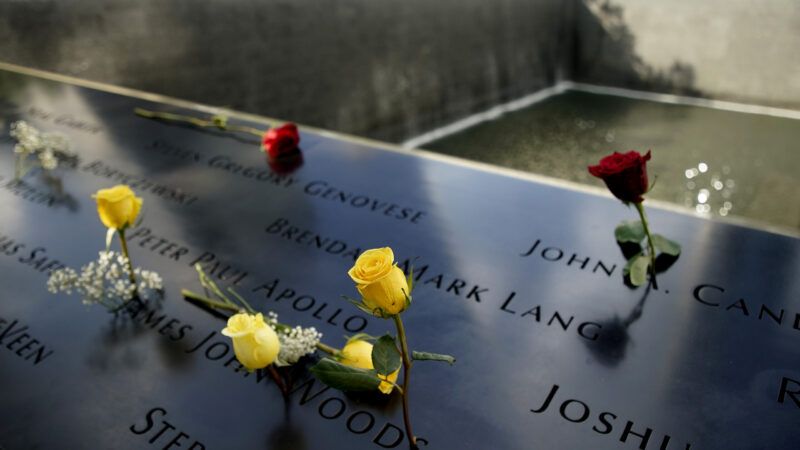My Generation Inherited the Aftermath of 9/11
Coming of age after the attacks.

In the dead of summer in 2005, my family moved to a small town near Shanksville, Pennsylvania. Flight 93 crashed in a clearing there a few years earlier, killing all 44 people on board. We set out to visit the memorial that had sprung up at the site.
The feelings from that day have stuck with me far longer than the fine points. I remember the thick silence. I remember how makeshift the whole thing seemed. Flowers, flags, and photographs were pinned to a chain-link fence in the middle of the field, much of the memorabilia weathered. I didn't quite know why we were all there.
On that day in Shanksville, my first interaction with the aftermath of 9/11, I was five years old.
I have no memory of September 11. Neither does nearly one-fifth of the country. What Millennials, Generation X, Baby Boomers, and the Silent Generation all ranked in a 2016 Pew Research Center poll as the single most impactful event of their lifetimes is just out of reach for those of us in Generation Z. In large part, people my age connect to the attacks more through the security and surveillance overhauls they sparked than the day itself.
The Transportation Security Administration (TSA) is perhaps the most visible of the homefront measures. I took only three flights as a baby before the agency's November 2001 creation. My parents and grandparents tell me that you could once greet people right at the gate. You didn't have to show up hours before departure. You could keep your shoes on in the security line (and calling it a security line might've even been a stretch).
As I travel now, that world is as foreign to me as the time when you could still smoke on planes. In some sense, these new annoyances are easier to stomach since I've never known travel without them. On the other hand, it's hard to see why an agency long proven ineffective continues to plague a generation that wasn't in the room when it came into existence.
The TSA has a weapons detection failure rate of somewhere between 70 and 95 percent, even as the government gives it billions of dollars to fulfill its seemingly straightforward mission. The biggest hassles I've had in TSA care have centered not on my transporting anything particularly weaponlike, but on a wooden elephant figurine, an umbrella, and a packet of chili powder. There hasn't been another 9/11 in my lifetime—not even close. But that's because most travelers are simply safe, not because the eagle-eyed TSA has been effectively quashing threats since 2001.
Being so removed from the 9/11 attacks, it's difficult for me to grasp how they galvanized the country. But even a forensic look shows how unifying the desire for security was. In the immediate aftermath of 9/11, over 70 percent of Americans surveyed by USA Today and Gallup feared that another terrorist attack "causing large numbers of American lives to be lost" would be somewhat or very likely "in the near future." Nearly 60 percent of respondents feared they or a family member would become a victim of terrorism. Even if the attacks were far away from most Americans, they felt close.
It's no wonder to the Gen Z eye that agencies sprung up to quell those fears. Post-9/11 creations like the TSA devoted themselves to maintaining fear and promising success, though the evidence behind both has been shaky. Taken with the other initiatives meant to keep us safe—from government surveillance of communications to our military campaigns abroad, and the massive costs we've incurred to fund them—my generation has grown up in a country fundamentally less free, and far more burdened, than the one my parents and grandparents knew.
Gen Z is better connected to the world than any generation before us, both physically and digitally. We can travel just about anywhere, talk to just about anyone. That openness necessarily comes with risks. But Gen Z never got to choose between safety and liberty.
President Joe Biden, to his credit, seems to recognize the senselessness of sending yet another generation of young Americans to die in an unwinnable conflict. There could one day be kids who haven't lived the majority of their lives in a country at war, as my peers and I have. The year I was born was the only one in which the U.S. was officially at peace in my life. With time and distance from the loss of 9/11, we can finally turn a critical eye to what we've lost militarily and realize that we have little left to gain.
The domestic damage is deep and dispersed. Those costs are harder to identify, and harder still to undo. Seeing the TSA simply as mundane, if annoying, masks what it has come to represent. Government action taken during an emergency will almost always outlive the emergency itself. The post-9/11 generation has only known a world shaped by fear-based governance. Every inch given has turned into a mile taken.
There have been no temporary responses to 9/11 in my life—only those that constantly hum in the background, seemingly without beginning and perhaps without end. Tens of millions of us can only mourn alongside the people who truly remember. The memory of 9/11 is no longer as unifying as it once was, but the loss of freedom it brought is something that we all share.


Show Comments (120)